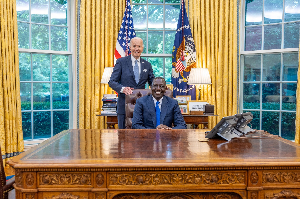Business News of Thursday, 18 June 2015
Source: B&FT
US$1.2 billion lost to tax incentives
A research by the Integrated Social Development Centre (ISODEC) and ActionAid Ghana has revealed that tax incentives granted in the 2013-14 government budget cost the nation about US$1.2billion -- or between 2-3 percent of GDP.
The outcome of the study by the two organisations, which was delivered at a workshop on tax justice and illicit financial flows and their impact on public goods and service delivery, noted that the tax incentives deny the country access to critical revenue for infrastructure projects.
Speaking at the workshop, Bernard Anaba -- Policy Analyst at ISODEC, said the practice of giving tax incentives does not necessarily serve the intended the purpose and in the long run costs the country funds that could be relied on for other development projects.
The granting of tax incentives, Mr. Anaba said, is part of a systemic process that denies the state requisite funds, with other negative processes being trade misinvoicing and under-invoicing among other means of illicit financial flows.
According to the ISODEC’s Policy Analyst, between the period of 2000 and 2013, Ghana lost US$7.4 billion in trade misinvoicing in trade with US and EU. Losses recorded in trade with EU accounted for US$6.2billion while that with the US recorded US$1.2billion.
He maintained that the illicit financial flows are not a sole Ghanaian problem, citing a report by the High Level Panel Meeting on Illicit Financial Flows that concluded Africa loses about US$50billion annually.
“IFF is a global problem and requires stronger collaboration and consistent engagement between Africa and global players such as the US, EU, G8 and G20 to help ensure greater transparency in the international Global financial system, with banks being required to ascertain the identity, source of wealth and country of origin of their depositors and their deposits,” he said.
The report further revealed that, globally, Africa had the highest illicit outflow to GDP ratio (5.5%) of any region from 2003 to 2012.
To address the problems of IFF there is a need to ensure that there are clear and concise tax laws and policies which have the philosophical basis needed to respond to the exploitative tendencies of capital.
“Our Customs authorities should begin to use available databases of information about comparable pricing of world trade in goods to analyse imports and exports, and identify transactions that require additional scrutiny,” he said.
To solve the problem of IFF, he advocated that establishing a transfer pricing unit as government has introduced is good -- but these units, he argued, have to be properly integrated with the entire audit system to be effective.
The workshop, under the theme Financing Ghana’s Socioeconomic Development: The Case of Tax Incentives and Illicit Financial Flows, is part of an ActionAid Ghana multi-country campaign on tax justice and contributes to the sensitisation and advocacy work related to the Economic Commission on Africa and Africa Union work on IFF.











